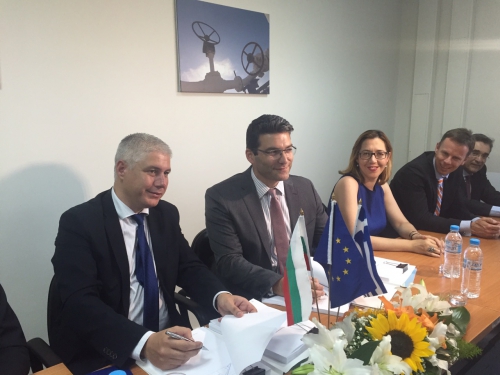Greece-Bulgaria Deal Opens Way for Freer Trade
Gas network operators Desfa and Bulgartransgas have signed an interconnection agreement allowing the transport of gas between Greece and Bulgaria from July 1.
The signing ceremony took place in the border area of Sidirokastro in northeast Greece. Based on the deal the partners will create a technical and commercial natural gas hub, Desfa said in a statement.

(Credit: Desfa)
Apart from the major geopolitical importance for Greece and Bulgaria, the agreement will also offer benefits for consumers as a result of more competition between suppliers, Desfa’s CEO Konstantinos Xifaras said.
Providing a reverse virtual flow at the interconnection point (IP) Kulata-Sidirokastro furthers the aim of a single European energy market, Bulgartransgas said, a notion which is defined partly by diversification of supply. "This provides the possibility for the virtual supply of natural gas from the Revithoussa LNG terminal in Greece. The agreement is signed for an initial test period of three months – from July 1 to October 1, 2016,” it said.
The European Commission has welcomed the agreement as a crucial step towards implementing EU rules on one of the last cross-border points in Europe where to date historic transit arrangements, tailored to a single company, prevailed, it said in a statement.
“The agreement is also the first step in giving access to other market players – for north- or southbound deliveries – along and beyond the important Trans-Balkan gas corridor between Greece, Turkey, Former Yugoslav Republic of Macedonia and Ukraine,” the EC said.
The EC considers it part of the broader Central and South Eastern Europe Gas Connectivity (CESEC) initiative launched in 2015 by 15 EU member states, the Energy Community, and the European Commission with the objective of diversifying gas supplies and increasing security of supply in the region.
This deal will be followed by similar agreements between the Bulgarian and Romanian and the Romanian and Ukrainian network operators respectively and a follow up on an agreement signed in 2015 between the Hungarian and Ukrainian network operators.
On June 13, Bulgaria launched the compressor station in the town of Petrich after modernization. Funded to the tune of €17mn by the EU, the project is expected to make Bulgaria more independent in terms of its energy supplies, the country's energy ministry said. The compressor station will enable Bulgaria to receive a third of its gas supplies from Greece – up to 3mn m³/day. At present Bulgaria uses slightly above 3bn m³/yr.
After the agreement becomes valid shippers who have booked capacity for delivery at IP Kulata - Sidirokastro must submit daily nominations for the quantities to be delivered or virtually received there and the direction of flow in either case, Desfa said.
Kama Mustafayeva


